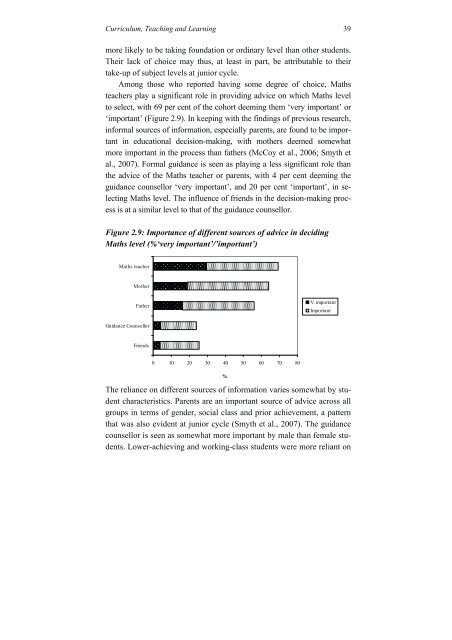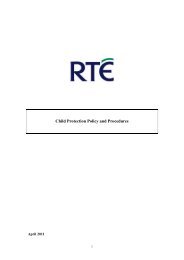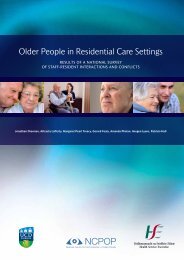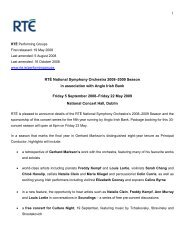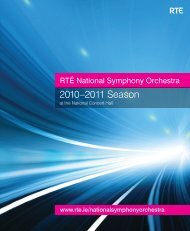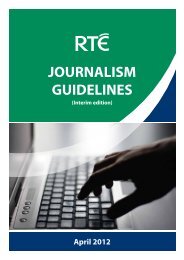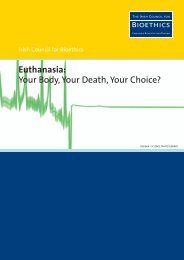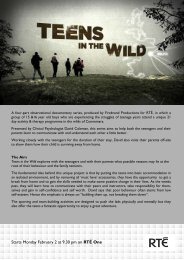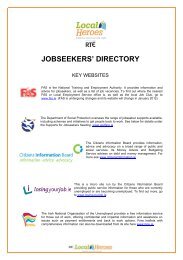- Page 1:
The Economic and Social Research In
- Page 5 and 6:
FROM LEAVING CERTIFICATE TO LEAVING
- Page 7 and 8:
CONTENTS List of Tables and Figures
- Page 9:
Contents vii 5.3.3 Always Wanted to
- Page 12 and 13: x From Leaving Certificate to Leavi
- Page 14 and 15: xii From Leaving Certificate to Lea
- Page 17 and 18: EXECUTIVE SUMMARY Introduction Curr
- Page 19 and 20: Executive Summary xvii centrate on
- Page 21 and 22: Executive Summary xix to higher edu
- Page 23: Executive Summary xxi Such a focus
- Page 26 and 27: 2 From Leaving Certificate to Leavi
- Page 28 and 29: 4 From Leaving Certificate to Leavi
- Page 30 and 31: 6 From Leaving Certificate to Leavi
- Page 32 and 33: 8 From Leaving Certificate to Leavi
- Page 34 and 35: 10 From Leaving Certificate to Leav
- Page 36 and 37: 12 From Leaving Certificate to Leav
- Page 38 and 39: 14 From Leaving Certificate to Leav
- Page 40 and 41: 16 From Leaving Certificate to Leav
- Page 42 and 43: 18 From Leaving Certificate to Leav
- Page 44 and 45: Chapter Two CURRICULUM, TEACHING AN
- Page 46 and 47: 22 From Leaving Certificate to Leav
- Page 48 and 49: 24 From Leaving Certificate to Leav
- Page 50 and 51: 26 From Leaving Certificate to Leav
- Page 52 and 53: 28 From Leaving Certificate to Leav
- Page 54 and 55: 30 From Leaving Certificate to Leav
- Page 56 and 57: 32 From Leaving Certificate to Leav
- Page 58 and 59: 34 From Leaving Certificate to Leav
- Page 60 and 61: 36 From Leaving Certificate to Leav
- Page 64 and 65: 40 From Leaving Certificate to Leav
- Page 66 and 67: 42 From Leaving Certificate to Leav
- Page 68 and 69: 44 From Leaving Certificate to Leav
- Page 70 and 71: 46 From Leaving Certificate to Leav
- Page 72 and 73: 48 From Leaving Certificate to Leav
- Page 74 and 75: 50 From Leaving Certificate to Leav
- Page 76 and 77: 52 From Leaving Certificate to Leav
- Page 78 and 79: 54 From Leaving Certificate to Leav
- Page 80 and 81: 56 From Leaving Certificate to Leav
- Page 82 and 83: 58 From Leaving Certificate to Leav
- Page 84 and 85: 60 From Leaving Certificate to Leav
- Page 86 and 87: 62 From Leaving Certificate to Leav
- Page 88 and 89: 64 From Leaving Certificate to Leav
- Page 90 and 91: 66 From Leaving Certificate to Leav
- Page 92 and 93: 68 From Leaving Certificate to Leav
- Page 94 and 95: 70 From Leaving Certificate to Leav
- Page 96 and 97: 72 From Leaving Certificate to Leav
- Page 98 and 99: 74 From Leaving Certificate to Leav
- Page 100 and 101: 76 From Leaving Certificate to Leav
- Page 102 and 103: 78 From Leaving Certificate to Leav
- Page 104 and 105: 80 From Leaving Certificate to Leav
- Page 106 and 107: 82 From Leaving Certificate to Leav
- Page 108 and 109: 84 From Leaving Certificate to Leav
- Page 110 and 111: 86 From Leaving Certificate to Leav
- Page 112 and 113:
88 From Leaving Certificate to Leav
- Page 114 and 115:
90 From Leaving Certificate to Leav
- Page 116 and 117:
92 From Leaving Certificate to Leav
- Page 118 and 119:
94 From Leaving Certificate to Leav
- Page 120 and 121:
Chapter Four LEAVING CERTIFICATE EX
- Page 122 and 123:
98 From Leaving Certificate to Leav
- Page 124 and 125:
100 From Leaving Certificate to Lea
- Page 126 and 127:
102 From Leaving Certificate to Lea
- Page 128 and 129:
104 From Leaving Certificate to Lea
- Page 130 and 131:
106 From Leaving Certificate to Lea
- Page 132 and 133:
108 From Leaving Certificate to Lea
- Page 134 and 135:
110 From Leaving Certificate to Lea
- Page 136 and 137:
112 From Leaving Certificate to Lea
- Page 138 and 139:
114 From Leaving Certificate to Lea
- Page 140 and 141:
116 From Leaving Certificate to Lea
- Page 142 and 143:
118 From Leaving Certificate to Lea
- Page 144 and 145:
120 From Leaving Certificate to Lea
- Page 146 and 147:
122 From Leaving Certificate to Lea
- Page 148 and 149:
124 From Leaving Certificate to Lea
- Page 150 and 151:
126 From Leaving Certificate to Lea
- Page 152 and 153:
128 From Leaving Certificate to Lea
- Page 154 and 155:
130 From Leaving Certificate to Lea
- Page 156 and 157:
Chapter Five GUIDANCE AND DECISION-
- Page 158 and 159:
134 From Leaving Certificate to Lea
- Page 160 and 161:
136 From Leaving Certificate to Lea
- Page 162 and 163:
138 From Leaving Certificate to Lea
- Page 164 and 165:
140 From Leaving Certificate to Lea
- Page 166 and 167:
142 From Leaving Certificate to Lea
- Page 168 and 169:
144 From Leaving Certificate to Lea
- Page 170 and 171:
146 From Leaving Certificate to Lea
- Page 172 and 173:
148 From Leaving Certificate to Lea
- Page 174 and 175:
150 From Leaving Certificate to Lea
- Page 176 and 177:
152 From Leaving Certificate to Lea
- Page 178 and 179:
154 From Leaving Certificate to Lea
- Page 180 and 181:
156 From Leaving Certificate to Lea
- Page 182 and 183:
158 From Leaving Certificate to Lea
- Page 184 and 185:
160 From Leaving Certificate to Lea
- Page 186 and 187:
162 From Leaving Certificate to Lea
- Page 188 and 189:
164 From Leaving Certificate to Lea
- Page 190 and 191:
166 From Leaving Certificate to Lea
- Page 192 and 193:
168 From Leaving Certificate to Lea
- Page 194 and 195:
170 From Leaving Certificate to Lea
- Page 196 and 197:
172 From Leaving Certificate to Lea
- Page 198 and 199:
174 From Leaving Certificate to Lea
- Page 200 and 201:
176 From Leaving Certificate to Lea
- Page 202 and 203:
178 From Leaving Certificate to Lea
- Page 204 and 205:
180 From Leaving Certificate to Lea
- Page 206 and 207:
182 From Leaving Certificate to Lea
- Page 208 and 209:
184 From Leaving Certificate to Lea
- Page 210 and 211:
186 From Leaving Certificate to Lea
- Page 212 and 213:
188 From Leaving Certificate to Lea
- Page 214 and 215:
190 From Leaving Certificate to Lea
- Page 216 and 217:
192 From Leaving Certificate to Lea
- Page 218 and 219:
194 From Leaving Certificate to Lea
- Page 220 and 221:
196 From Leaving Certificate to Lea
- Page 222 and 223:
198 From Leaving Certificate to Lea
- Page 224 and 225:
200 From Leaving Certificate to Lea
- Page 226 and 227:
202 From Leaving Certificate to Lea
- Page 228 and 229:
204 From Leaving Certificate to Lea
- Page 230 and 231:
206 From Leaving Certificate to Lea
- Page 232 and 233:
208 From Leaving Certificate to Lea
- Page 234 and 235:
210 From Leaving Certificate to Lea
- Page 236 and 237:
212 From Leaving Certificate to Lea
- Page 238 and 239:
214 From Leaving Certificate to Lea
- Page 240 and 241:
216 From Leaving Certificate to Lea
- Page 242 and 243:
218 From Leaving Certificate to Lea
- Page 244 and 245:
220 From Leaving Certificate to Lea
- Page 246 and 247:
222 From Leaving Certificate to Lea
- Page 248 and 249:
224 From Leaving Certificate to Lea
- Page 250 and 251:
226 From Leaving Certificate to Lea
- Page 252 and 253:
228 From Leaving Certificate to Lea
- Page 254 and 255:
230 From Leaving Certificate to Lea
- Page 256 and 257:
232 From Leaving Certificate to Lea
- Page 258 and 259:
234 From Leaving Certificate to Lea
- Page 260 and 261:
236 From Leaving Certificate to Lea
- Page 263 and 264:
REFERENCES Airasian, P.W. and Madau
- Page 265 and 266:
References 241 Grodsky, E., Warren,
- Page 267 and 268:
References 243 Mickelson, R.A. (199
- Page 269 and 270:
References 245 Smyth, E. and Calver
- Page 271:
Current debates about senior cycle


